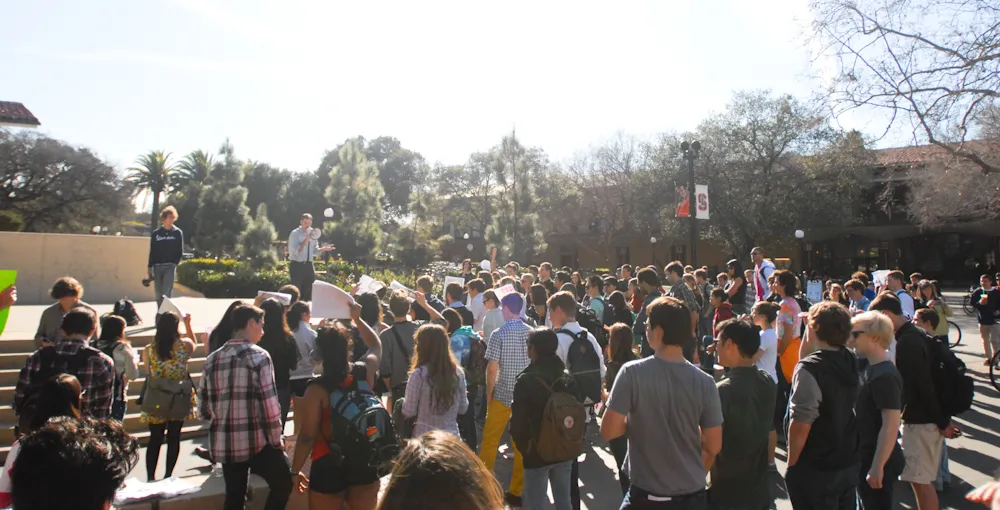
More than 120 Stanford students gathered in the middle of White Plaza on Monday afternoon to protest the University’s recent decision to end student management at Suites Eating Clubs.
The move to contract the operations of Suites Dining to an outside vendor, which was announced by Residential Education (ResEd) at the end of January, has been widely derided by the Stanford community as symptomatic of the University’s corporatization and representative of an increasing encroachment upon student autonomy.
Students who showed up at the protest said the event stemmed from frustration over a series of University decisions — which they felt had been made without serious consultation from the community members that would subsequently be affected — made over the past three years.
These include the University’s decisions to revoke the lease of the student-run Chi Theta Chi last February, to launch a $5.5 million project to install of card readers on Row houses last fall and to establish a new food vendor policy that has driven popular food trucks off campus this winter.
“There is a common theme of [the] University administration not consulting with the student body while drafting these decisions, instead implementing these decisions and then announcing them to the masses through email,” said event organizer Ma’ayan Dembo ’14, speaking through a loud speaker while standing on the stage outside of Dinkelspiel Auditorium. “It is our right as paying students and adults to have a voice on these reforms and demand more transparency from the administration.”
The statement received one of the largest rounds of applause of the day from the audience. A few of its members waved signs and banners with slogans like “Stop $tanford” and “Goodbye wind of freedom, Hello $tanford Housing.”
Students seeking a voice
Miles Unterreiner ’12 M.A. ’13, a Daily staffer, has been credited for helping such issues gain traction among the student body, and his long-form article about the end of Suites Dining’s student management has prompted extensive reader response since its publication last week. As of Monday night, the first page of the online article has received more than 2,500 Facebook likes and 16,400 unique page views, making it the fifth most-read story on the Daily’s website since the 2008-09 academic year.
The article was part investigative journalism, examining the rationales put forward by ResEd as justifying ending student management at Suites Dining, and part personal narrative, exploring Unterreiner’s own experience working as a hasher at Suites and his interactions with its chefs, particularly Bollard Eating Club head chef Frank Hassan.
Speaking to The Daily the night before the protest, Dembo, who is neither a Suites nor XOX resident, said that it was this article that inspired her to take action.
“I was reading through the article, and at the end, it said something like, ‘It’s time to take action,’ and I realized, ‘Yeah, we should,’” Dembo said. “I was talking about it with my friends all weekend, kind of expecting and waiting for something to happen, and then I finally decided that maybe I should be the one to take action instead.”
According to Dembo, she sent out an email to 12 of her friends Sunday afternoon, with the intention of collectively walking into the ResEd office and attempting to have a conversation with administrators. The email, however, was quickly forwarded to several large student mailing lists. Even so, as of Sunday night, Dembo still predicted that approximately 30 to 50 students would turn up.
“I was not expecting this many people to show up,” Unterreiner agreed after the event. “We didn’t even get the Facebook page up until yesterday evening. I was a little worried that there hadn’t been enough publicity and enough people wouldn’t show up, so I think the fact that on one night’s notice you can have over 100 people show up to White Plaza…I think it just shows how deep the discontent runs and just how powerful students feel about this. That was encouraging to me.”
Unterreiner helped to publicize the event to students on Facebook since Dembo did not initially have an account on the social networking site. He also spoke at the protest.
“ResEd is interested in eliminating a non-profit organization and replace it with a for-profit corporation,” he told to the crowd. “It makes no economic, moral or ethical sense. We are here because ResEd is corporatizing student dining at the expense of students like you guys.”
According to Unterreiner, one of the most positive aspects of the protest was providing the chefs from the Suites Dining Clubs — whose contracts, as of now, will not be renewed next year — an opportunity to voice their opinions. The audience broke out into applause when Hassan and Avanti chef Anton “Tony” Dietz showed up in White Plaza.
“It would be nice to know what exactly is the mission of Residential Education,” Dietz said on stage. “I would think their capacity is one where they are advisors [to] students, not to be an organization that dismantles your dining societies.”
Instead of marching to the ResEd Central Office in Tresidder Union as initially planned, the protesters ended up being able to ask questions of Nate Boswell ’99 M.A. ’09, associate dean of ResEd, who had showed up on the steps of Dinkelspiel Auditorium prior to the event.
“He said he’s here to listen, so I’m hoping that he really is here to listen and dialogue,” said Erika Kreeger ’15, a student protester, when news first spread among the crowd that Boswell had made an appearance at the event.
Boswell introduced himself as a Stanford alumnus who had been a member of the Avanti Dining Society himself during his time here.
“I think that in the long run we will have to be able to sit down with a representative group, not just the Governor’s Corner Dining Society, perhaps the ASSU or you guys here today to talk through those things a little bit more,” Boswell said.
Overall, Boswell appeared comfortable and willing to engage with protestors, although students in the crowd criticized him of saying little of substance.
At one point, Boswell said, “Let me say that I think ResEd is a nexus point for University communication.” Unterreiner quickly followed up with, “What does that mean?” which resulted in an outburst of laughter from the audience. One male student exclaimed loudly, “Bullshit!”
Throughout the event, Unterreiner pressed Boswell with the question, “How does this make student life better?” when Boswell continued to talk about the reasons for ending the student management of Suites Dining Clubs.
“I don’t have an answer,” Boswell eventually responded.
Boswell did say that there were aspects of the situation surrounding Suites Dining that students did not know about, which contributed to ResEd’s decision.
“Many of you probably don’t know — I can’t talk about it much — but you don’t know that there is active litigation against the Governor’s Corner Dining Society by a former employer and against Stanford University,” he said. “We have been uncomfortable talking about that.”
In a post-event interview with the Daily, Unterreiner alleged that this was a dirty trick by Boswell.
“I was disappointed by that tactic because there is a lawsuit ongoing against both Governor’s Corner Dining Society [GCDS] and the University — I’m not allowed to comment on that, and nobody is allowed to comment on that,” Unterreiner said. “I really don’t know what I can say within the bounds of the law, but having that tossed around tossed a lot of doubt on our credibility without having to prove that the lawsuit has any merit. I thought it was unfair to mention that there is a lawsuit ongoing that makes it seem like there are terrible things going on in Suites, which there are not.”
Unterreiner also added that the GCDS has a $2 million liability policy for exactly this sort of situation.
An emerging dialogue
After the event, Boswell told a group of students that Students Organized Services (SOS) is no longer interested in bidding for Suites Dining. SOS is a for-profit, privately-held company, which operates food-related labor services for the Row and which is headed up by Nick Peters ’94.
Peters’ brother-in-law is Zac Sargeant, who was hired as assistant director of ResEd in 2008. Because of this connection, students have accused ResEd of ignoring — or perpetuating — a conflict of interest in choosing SOS as the private contractor for Suites.
According to Unterreiner, the current chefs of Suites Dining Clubs now plan to incorporate as an LLC before next year and bid to be the private contractor for Suites. Boswell seemed to be amenable to this course of action.
“We would feel more comfortable if the chefs were the vendors rather than the students were the vendors,” Boswell told a group of students following the formal protest. “The chefs are professionals, who — as they have said — who we can work with, hold accountable and interact with and so on.”
Unterreiner said this is still not the ideal scenario, and that he will continue to fight for a student-run Suites Dining.
“I think even forcing the chefs to go up against an outside company is inherently disrespectful to the service that they have put in over years over many many years of service to Stanford,” he said. “They shouldn’t have to compete against an outside company for reasons that haven’t been fully explained. My goal is to fight against them having to bid at all.”
Students also said that they will continue to fight against ResEd and University administrators.
“I was responding to a really well-written article that made concrete a lot of the things that were wrong with this particular situation,” said Elizabeth Matus ’14, a protester. “And the University — if it wants to have any leverage way — will have to respond in an equally concrete and thorough way.”
Justine Moore and Olivia Moore contributed to this report.
